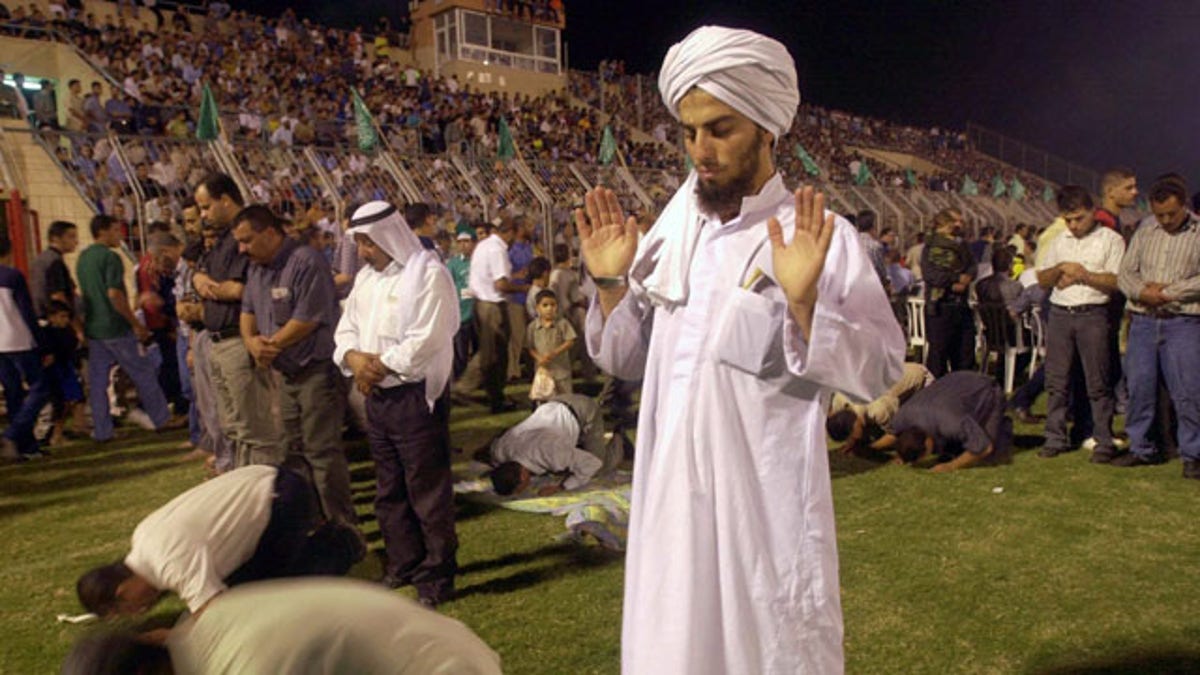
FILE - In this Friday, Sept. 14, 2001 file photo, an Israeli Arab prays alongside other Muslims during a rally of the Islamic movement in the Arab Israeli town of Um El-Fahem. (AP Photo/Elizabeth Dalziel, File)
JERUSALEM – Israel announced Tuesday it has outlawed an Islamist party accused of inciting violence among the country's Arab citizens, as part of measures to stamp out a two month-long deadly escalation.
The government declared the Northern Branch of the Islamic Movement of Israel illegal, saying its activists could be subject to arrest if they violate the ban.
The party, which provides religious and educational services for Israeli Arabs, routinely accuses Israel of trying to take over a sensitive holy site in Jerusalem, a charge Israel denies. The site is at the heart of the latest surge in Israeli-Palestinian violence.
After the decision, Israeli forces searched more than a dozen of the group's offices around the country, seizing computers, files and funds, police said. Authorities also froze its bank accounts and said that 17 organizations affiliated with the party were served with orders to close down.
Israel's Public Security Minister Gilad Erdan linked the decision to the attacks in Paris, saying in a statement that "Israel must act as an example and spearhead the struggle against radical Islam whose emissaries we saw massacring innocent people in Paris" and elsewhere.
Prime Minister Benjamin Netanyahu said "the goal is to stop the dangerous incitement at home and prevent harm to innocent life."
Radical cleric Raed Salah, the group's leader, was defiant, saying his party would fight the measure and continue its mission.
"All these measures done by the Israeli establishment are oppressive and condemned," Salah said in a statement, adding that he and two other party leaders were summoned to police questioning.
Separately, Salah is set to start an 11-month jail term later this month in connection with incitement charges from a 2007 sermon.
The ban sparked outrage among Arab leaders and lawmakers who condemned the move.
Mohammed Barakeh, the head of an umbrella group of Arab Israeli political parties and community leaders, called the decision "an unjustified draconian step." The umbrella organization was set to hold an emergency meeting about the ban.
The Jerusalem hilltop compound, holy to both Jews and Muslims, houses the Al-Aqsa mosque and is the third holiest site in Islam. It is the holiest site in Judaism and was home to the biblical Jewish Temples.
The current round of violence erupted in mid-September over rumors that Israel was trying to expand Jewish presence at the Jerusalem shrine and spread to the West Bank, Israeli cities and the Gaza border. Palestinian attacks, mainly stabbings, have killed 14 Israelis, and at least 83 Palestinians have been killed by Israeli fire, including 51 Israel says were involved in assaults. The rest were killed in clashes with security forces.
Salah has alleged in speeches and annual rallies under the heading "Al-Aqsa is in Danger" that Israel plans to expand its control there.
Since 2001, the Islamic Movement has bused tens of thousands of supporters to the mosque compound every year to strengthen the Muslim presence.
Several years ago, the movement helped form groups of male and female activists, known as "Morabitoun" -- loosely translated as defenders of Islamic lands -- who spend hours each weekday at the shrine trying to disrupt visits by Jews.
During periods of tension, police at times block busloads of Islamic Movement supporters from Jerusalem. Earlier this year, Israel outlawed three associations suspected of funding the Morabitoun and later declared the groups illegal.
Israel says the violence is the result of incitement from Palestinian leaders and has blamed the Islamic Movement for fanning the flames among the country's Arabs. The Palestinians say the violence stems from frustration over nearly half a century of Israeli occupation.
In its struggle to contain the violence, Israel has beefed up security across the country, sending hundreds of soldiers to back up police, and setting up checkpoints and concrete barriers in Arab neighborhoods of east Jerusalem, where many of the attackers have come from.
